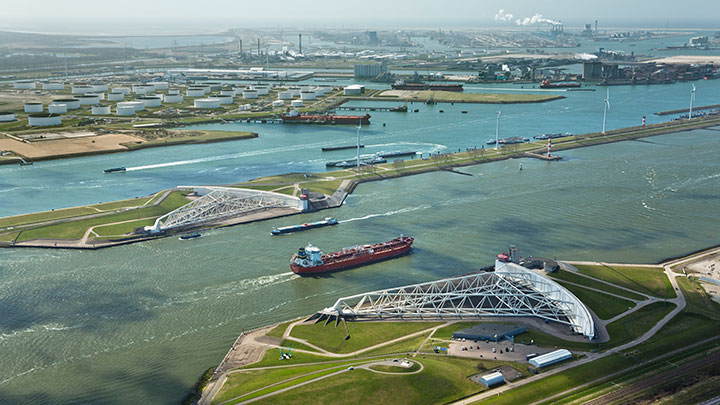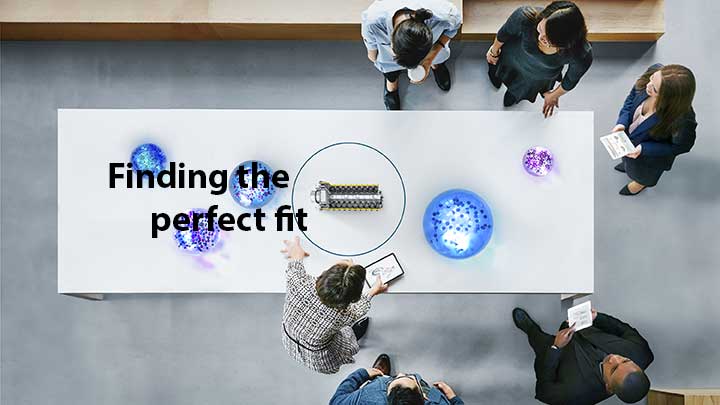Powering sustainable shipping
The global shipping industry is working towards a sustainable future. This means that you will face important choices about the technologies and investments you need in order to stay competitive and at the forefront of compliance for decades to come.
At MAN Energy Solutions, we are helping to shape the sustainability agenda and provide a clear path for you to achieve your goals. As the industry’s trusted partner for class-leading marine systems, we have the expertise and solutions ready
now to support whatever decisions you make.
Introduction to future fuels
Reduction of greenhouse gas emissions in maritime shipping to meet the 2050 targets requires all parties involved and stakeholders to take action.
No matter what vessel you operate, our proven, fuel-flexible engines and propulsion systems enable you to safeguard your future fuel strategy and allow you to take advantage of favorable market conditions. We can also support you with a complete portfolio of retrofit solutions, upgrades, and services, designed to optimize returns from your existing investments.

Future fuels survey 2022 - results
At the end of 2022 we asked our four-stroke customers to participate in our short survey about Future fuels in the maritime shipping industry. Out of all replies, we have extracted and summarized the most relevant results and are happy to share them now with you.
When do you expect the following fuels and engine attributes to be relevant in your application?
In the short and mid term, biofuels and methanol are expected to take the lead and be most relevant for four-stroke applications in the upcoming years, in parallel to a continuously relevant share of LNG driven vessels.
Mid to long term, additional fuels, such as NH3 ready or even H2 may gain relevance.
Future fuels for the maritime industry – Download our new white papers
The shipping industry must halve its GHG emissions by 2050. There are many future fuels to choose from. But which one is right for you?
Learn more about future fuels for the marine industry in our white papers.
Read more about the different future fuel types and discover our extensive portfolio of products, solutions, and services.
Get in touch with our experts
Would you like to learn more about future fuels and which technologies, solutions, and products best meet your needs?
Our global network of dedicated engineers is happy to point out the perfect-fit solution for you and your business. Start your engines now and reach out to us today.

Explore your fuel options
We can now offer multiple options for full fuel flexibility, engine-integrated emission reduction technologies and digital & data-supported operation.
Check out our configurator for two- and four-stroke engines, and find out more.
Related news
Fuel from Waste: Volkswagen Powers Car Freighters with Used Oil from Restaurants
The Volkswagen Group continues to force the pace of climate protection: in future, Volkswagen Group Logistics will be using certified fuel from vegetable residues for certain new car shipments via marine routes. The fuel is produced from materials such as used oil from restaurants and the food industry. The first car freighter was re-fuelled for the first time with this oil in mid-November 2020 and a second ship is due to follow at the beginning of 2021.
“We are the first automaker to make widespread use of this fuel. This way, we reuse waste oil in an environmentally compatible way. With 85% lower CO2 emissions than with conventional fossil fuels, the contribution to climate protection is enormous,” says Thomas Zernechel, Head of Volkswagen Group Logistics.
For European shipments, Volkswagen Group Logistics continuously charters two vessels which carry up to 3,500 vehicles on a route from Emden via Dublin (Ireland), Santander (Spain) and Setubal (Portugal) back to Emden about 50 times per year. In the course of their journeys, they carry about 250,000 new vehicles of the AUDI, SEAT, ŠKODA, Volkswagen Passenger Cars and Volkswagen Commercial Vehicles brands every year.
The two ships, which are both 180 metres long, are each powered by an MAN marine diesel engine with more than 19,000 PS (14,220 kW). In future, the two ships are to be refueled at sea off the coast of Vlissingen (Netherlands) with alternative fuel supplied by the Dutch company GoodFuels. This way, the CO2 emissions of the two conventional vessels along their route will be reduced by more than 85% – from over 60,000 to about 9,000 tonnes per year. In addition, sulphur oxide emissions will be almost completely avoided.
This change is part of a strategy to make Group Logistics even greener: another element is the use of liquefied natural gas (LNG) to power car freighters. These vessels travel between Europe, North America and Latin America. Furthermore, all rail shipments in Germany with DB Cargo are being changed over to eco-power. “This way, Volkswagen Group Logistics is helping the Group achieve net carbon neutrality by 2050,” says Zernechel.
Documents
-
20201203 MAN_ES_PR VW Fuel from waste
Contact
Jan Hoppe
Head of Group Communication & Marketing
Group Communications & MarketingMAN Energy Solutions SEStadtbachstr. 186153 AugsburgGermany
Jan.Hoppe@man-es.com t +49 821 322 3126Get notified about press releases
Explore more topics
Alternative fuels for your two-stroke powered vessel: Ammonia, methanol and methane in focus
Register for our next MAN ExpertTalk on alternative fuels for large merchant marine vessels. We will provide insights into the most promising marine fuels of the expected future fuel mix for two-stroke vessels, namely ammonia, methanol and methane.
Further, we will inform about the latest product developments and applications as well as reasons why these fuels have the potential to offer a straightforward path for the future maritime energy transition.
- Wednesday, April 24, 15:00 – 15:45 (W. Europe Standard Time)
- Thursday, April 25, 10:00 – 10:45 (W. Europe Standard Time)
